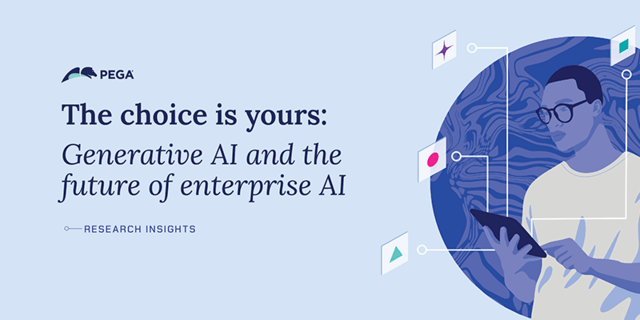Pega recently conducted original research with Savanta, learning what 500+ global decision makers think of GenAI and how to implement this groundbreaking technology in their enterprises. Results released in June revealed that there are gaps between perception and reality on how it’s understood, trusted, and utilized across organizations and functional areas.
If marketing and customer engagement professionals can break through the hype-cycle of fear and noise around artificial intelligence, the benefits can far outweigh challenges. They just must be willing to dig in and separate perception from reality. For example, 93% of business leaders surveyed claim to have a good understanding of AI and its workings. Despite this confidence, only 5% of those surveyed correctly recognize that AI can produce the business outcomes outlined in a list full of potential benefits – with just 30% aware of AI’s potential to boost marketing click-through rates and 32% understanding its role in providing better customer insights.
Leveraging AI for personalized customer experiences amid trust issues
Operationalizing customer insights into action is the bedrock of delivering value through personalized customer experiences. Transactional personalization doesn’t work for consumers anymore. Their expectations now include both relevance and respect for their privacy. Creating truly personalized experiences in this high-stakes environment is challenging but achievable, especially with the right tools and culture. At PegaWorld Inspire 2024, Navy Federal Credit Union’s Suzanne King delivered the breakout session, Personalization to Hyper-Personalization: Navigating the Multichannel Journey. In it, she demonstrated how the institution leverages AI-powered decisioning to better utilize customer insights and turn them into opportunities to delight their members. For example, the institution can use insights to understand how behavior like using an out-of-network ATM creates an opportunity to help their members save on ATM fees. Members can avoid the fee by using the NFCU mobile app, online banking, or an in-network ATM. And using AI-powered decisioning to find the right moment to share when it will make the biggest impact helps create lasting relationships with their members. Their members noticed, because they’ve been able to reduce out-of-network balance inquiries by 79%.
Concern and fear still permeate the business landscape in several areas. For example, 51% rightfully worry about transparency and bias, 42% fear job loss, and 40% have dystopian concerns about AI-powered robots. Ultimately though, over one-third of those surveyed view AI as a partner for innovation. Businesses trust humans more for building customer relationships (15%) than AI (7%), but trust significantly increases (41%) when humans use AI assistance.
Strengthening customer relationships with human-AI partnerships: AGL Energy's success
This last part is critical. The development of human AI partnerships will be instrumental in building customer relationships, but investment in this area will also decrease fear of job loss as it strengthens employee productivity. AGL Energy has experience with this.
AGL delivers electricity, gas, mobile, and broadband services to more than four million customers, representing nearly 30% of Australian households. They recently embarked on a transformative journey aimed at harnessing the power of technology to drive efficiency, scale, and automate within their organization. Their core goal was to establish strong and lasting connections with customers through a combination of advanced technologies, data analytics, and real-time insights to ensure every interaction is personalized and relevant. Central to AGL's transformation is its Customer Engagement Engine – built on Pega Customer Decision Hub™.
Although their aim was to improve customer engagement (and they did) – achieving a 30-point Net Promotor Score increase over five years – they have enjoyed additional benefits by fostering trust in technology internally. AGL also focused on enhancing the user experience for frontline staff. It leveraged technology and AI as an enabler rather than a threat, offering comprehensive training and transparent communication that demonstrated its value in practice. For example, the organization digitized formerly manual campaign analysis and enabled daily reporting for over 200 staff members, enabling them to act on insights in real time. Not only is this an ideal scenario for most marketing and customer engagement teams, their human-AI partnership has helped them achieve a 75% reduction in cost per opportunity.
The survey results reveal a complex landscape of AI understanding, trust, skills, and implementation. Businesses face significant challenges in education, trust-building, and strategic deployment, but the above client successes demonstrate substantial gains when these opportunities are in play. Organizations that address these issues with cohesive strategies can maximize AI’s benefits for both customer experiences and business outcomes.
For a dynamic look at the survey results, download the full research insights here to understand the outlook on AI for the enterprise–and how it is poised to enable true transformation for customer engagement and beyond.

